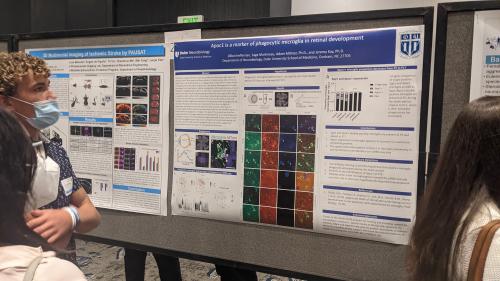
Local Neuroscientists Share Research at Triangle Society for Neuroscience Meeting
Over 100 people with brains on their mind congregated to the Embassy Suites in Cary, NC last Friday, Sept. 9. Neuroscientists from all across the Research Triangle came out for the annual Triangle Society for Neuroscience meeting, a local chapter of the largest professional society for neuroscientists.
"It's easy to go years without realizing how much cool science is right next door at our neighboring institutions," said Alison Adcock, M.D., Ph.D., director of the Duke Institute for Brain Sciences, and professor in psychiatry & behavioral sciences at Duke. "This conference is a great place for students of all levels - this year including high school - to present their work in a relaxed atmosphere. It's also an opportunity to talk to people from very different fields, so you can focus on what's exciting about what you are doing and practice communicating its importance to people."
Attendees included scientists from many of the nearby universities, including Duke University, University of North Carolina - Chapel Hill (UNC-CH), East Carolina University (ECU), North Carolina State University (NCSU), North Carolina Central University (NCCU), and North Carolina Agricultural & Technical State University (NC A&T), as well researchers from local federal institutes, such as the Environmental Protection Agency (EPA), and the National Institute for Environmental Health Sciences (NIEHS).
Throughout the day, participants were provided with a full day of talks, posters, coffee, and of course, promotional giveaways from sponsors (such as the particularly popular rainbow umbrellas from Chroma).
Research talks on neurotoxins and nervous system disorders
Conference goers were treated to several talks throughout the day from local experts focused on two main themes:
1) the impact of environmental toxins on the brain, including talks by:
- Ed Levin, Ph.D. (Duke), who spoke about how early-life exposure to pollutants, such as lead, pesticides, and flame retardants, can have major and persistent effects on developing brains and behavior;
- Tim Shafer, Ph.D. (EPA), who shared new approaches for evaluating a given chemical’s developmental neurotoxicity, which currently costs an astounding $1 million per chemical, and takes two years of research to study, and requires nearly 1,000 animals for experiments; and
- Scott Swartzwelder, Ph.D. (Duke), who provided a historical perspective on the oft-forgotten early research describing the impact of alcohol consumption on adolescent and adult brains.
and, 2) therapeutic advancements for nervous system disorders, including talks by
- Justin Wolter, Ph.D. (UNC-CH), who presented work on a novel gene therapy to treat the genetic disorder Angelman Syndrome;
- Erin Baker, Ph.D. (UNC-CH), who shared how Alzheimer’s disease confers distinct molecular changes based on the specific iteration of the APOE allele; and
- Ryan Weeks, Ph.D. (NCSU), who described work using zebrafish to study the neurodegenerative disease amyotrophic lateral sclerosis.
The meeting was capped off by a keynote presentation by Baljit Khakh, Ph.D. (University of Californa Los Angles), who shared his lab’s work detailing the role of astrocytes in shaping neural circuits and behavior.

Poster presentations on everything from lemurs to the retina
Flanking the lunchbreak were two jam-packed poster presentation sessions. Brain researchers from Duke across all levels (undergraduate to postdoctoral scholars) presented a diverse array of science not often heard in the same room.
Allie Schrock, an evolutionary anthropology graduate student at Duke in the lab of Christine Drea, Ph.D., presented her work on lemurs. Lemurs’ social organization varies by species, and span the gamut of egalitarian, to being dominated by one sex (male or female). Schrock found that despite peptide hormones like oxytocin and vasopressin being critical for social behavior, the amount of hormone receptors across the brain is seemingly disconnected to a lemur's social structure. Going forward, Schrock is turning her attention to steroid hormone receptors, such as estrogen and androgen, to see if they are more telling predictors for social systems in lemurs, thanks in-part to a seed grant from the Duke Institute for Brain Sciences.
Local high schooler Dillon Heffernan took the day off from classes to present his work on how glia cells shape retinal development in mice, which he researched during his time as a DUNE scholar in the lab of Duke neurobiology professor Jeremy Kay, Ph.D.

Elizabeth Matthews, Ph.D., a research scientist in the lab of Duke neurosurgery professor Derek Southwell, M.D., Ph.D., revealed a first in neuroscience: the ability to tag specific brain cell types in humans in order to characterize their unique physiology. Dr. Matthews’ project, in collaboration with the lab of Duke neurobiology professor Josh Huang, Ph.D., uses a new RNA technology enabling her to add fluorescent markers to sub-specific neuron types (e.g. parvalbumin interneurons), which she uses to identify and document their distinctive electrical properties. In addition to being able to pick-and-choose brain cell types, Dr. Matthews also shared that while previous methods have less than a day to record from human brain cells, her and her team figured out how to preserve the tissue for over a month, allowing them record cell activity for up to 40 days.
Next year in the spring
This year’s annual meeting was postponed until September, but those interested in joining the festivities should keep their calendars open for late Spring 2023 for the next Triangle SFN meeting. To learn more about the local Triangle SFN chapter, become a member, and stay up-to-date on their happenings throughout the year, be sure to visit their website: https://www.trianglesfnchapter.org/home.



